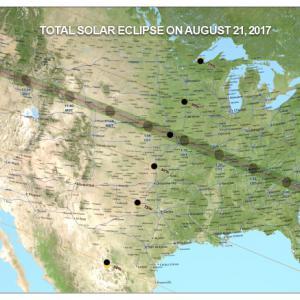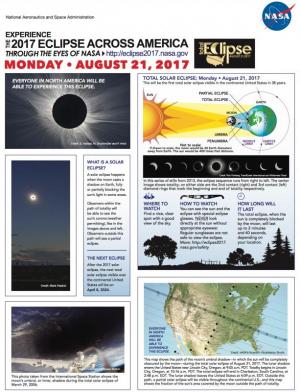Residents staying in Sussex County on Monday, Aug. 21, will still be able to participate in the eclipse mania sweeping the nation, but it won't be nearly as impressive an experience as those in the path of the long-anticipated event.
The county is several hundred miles north of the path of solar eclipse totality. The percent of coverage of the sun by the moon decreases with every mile away from the direct path.
According to the website eclipse2017.org, the eclipse in Delaware will begin at 1:20 p.m. Then at 2:43 p.m., 77 percent of the sun will be covered. “But the partial eclipse is boring. We recommend you get south to see the path of the total eclipse,” the website suggests.
The closest total-eclipse viewing location south of this area is about a 10-hour drive to the coast of South Carolina, about halfway between Myrtle Beach and Charleston. There you can watch the sun go dark for more than 2 minutes, 30 seconds.
Judi Provencal, an associate professor of astronomy at the University of Delaware, said in this area it will seem like a big cloud has gone over the sun. “It will appear that the moon is taking a big bite out of the sun,” she said.
Provencal said this eclipse is special because it's the first time a full eclipse will cut across the United States in nearly a century. “It will be visible to millions of people who wouldn't ever even think about seeing such a thing,” she said. “It will probably be the most photographed and videoed eclipse ever. And maybe it will motivate the next generation of astronomers.”
Besides location, weather plays a critical part part in any viewing experience. The forecast for this area is mostly sunny for Aug. 21.
Events from sea to shining sea
A full solar eclipse that crosses all or parts of 14 states from Oregon to South Carolina is rare. It has created a frenzy of eclipse mania, with special events scheduled from sea to shining sea. The last time a solar eclipse crossed the entire country from the Pacific to the Atlantic, from Washington to Florida, was June 8, 1918.
Towns and cities near the 2,500-mile-long, 70-mile wide path of the total eclipse are capitalizing on the event. In Hopkinsville, Ky., residents are planning a major celebration as the eclipse passes almost directly over the middle of town, now calling itself Eclipseville.
Officials say the town of 33,000 will explode with more than 100,000 visitors to see the full eclipse, which will last 2 minutes and 41.2 seconds. The event coincides with the town's fifth annual Little Green Men Festival.
Carbondale, Ill., is another prime viewing spot that is going all out to attract visitors as the town with the longest eclipse duration at 2 minutes, 41.6 seconds. NASA will live-stream the eclipse from the town of 26,000 people. Grant City State Park, just south of the town, is on the center line of the total eclipse.
Carbondale – billing itself as the Eclipse Crossroads of America – has the rare distinction as the epicenter of another total eclipse on April 8, 2024. The path of that eclipse will pass from Mexico to Maine.
Nashville, Tenn., is the largest city within the direct path and Columbia, S.C., is the most accessible city on the East Coast. Both cities have several special events planned.
Scientists say playing the weather odds, some of the best viewing places with the longest total duration will be the sand hills of Nebraska, the area around Casper, Wyo., and St. Joseph, Mo.
Because of the vastness of the path and the widespread use of social media, astronomers say this will be one of the most photographed, most shared and most Tweeted events in history.
Nearby locations to view the eclipse
One of the best places locally to view the eclipse will be at the Delaware AeroSpace Education Foundation's facility at 585 Big Oak Road, Smyrna, from 1 to 4:30 p.m. Seven telescopes with solar filters, $1 eclipse glasses, a moon bounce and food trucks will be available.
NASA's Wallops Flight Facility Visitors Center near Chincoteague, Va., will host an eclipse viewing event and provide free safety glasses, NASA's live-stream and solar-related activities from noon to 4:30 p.m.
Lewes library, 111 Adams Ave., will have a viewing event at 2 p.m. Phone 645-2733 to pre-register.
Area residents traveling for better view
Some area residents are heading south or west to get a better view. Ed Ford of Camden is going to Teton National Park. Ford also purchased a new camera with a long telephoto lens to capture a shot of the rare event. The Tetons will go dark for 2 minutes, 20 seconds.
Dan Nelson of Seaford said he plans to head into the direct path of the eclipse and will be boating on the Tennessee River near Spring City, Tenn.
Ryan Faucett plans to be in central Wyoming with his girlfriend “for a humbling display of cosmic synchronicity,” as he puts it.
It's only fitting that he would want to see a total eclipse – he works for CNC Solar in Rehoboth Beach.
Mike Potter of Millsboro, a board member of the Delmarva Space Science Foundation, is on a western national parks tour and will witness the total eclipse in Jackson, Wyo.
ECLIPSE TRIVIA
• What's an eclipse? In simple terms, it's when the sun, moon and Earth line up and the moon casts its shadow on the Earth.
• The last solar eclipse in the United States occurred Feb. 26, 1979, over five states in the northwestern region of the country.
• Amtrak's eclipse train to Carbondale, Ill., sold out in less than one day. More than 400 riders will take the train to the town and join in the festivities.
• Umbra is total eclipse and penumbra is partial.
• Everyone living in the continental U.S. will be affected by this year's eclipse. Residents living at the northern tip of Maine will see a 48 percent partial eclipse.
• Safety glasses to view an eclipse should be equal to the protection of at least 13 pairs of sunglasses.
• Total solar eclipses can last longer than 7 minutes, but the duration time varies.
• It gets weird. Ozzy Osbourne will perform during the eclipse at the Moonstock rock festival in Carterville, Ill.
• The April 8, 2024, solar eclipse will pass closer to Delmarva, with cities such as Erie, Pa., and Buffalo, N.Y., in the center of totality.
Never look directly at the sun
Even with a partial eclipse, experts warn people not to look directly at the sun without eye protection. For safety tips, go to eclipse2017.nasa.gov/safety.
When any part of the sun is visible, do not look at the sun without approved solar filters that are used properly. Do not assume that sunglasses, exposed film, CDs, or any other ad hoc filters are safe.
There are a host of websites with eclipse information:
greatamericaneclipse.com
visithopkinsville.com
carbondale.com
eclipse2017.nasa.gov
space.com/15584-solar-eclipses.html
greatamericaneclipse.com/phenomena





























































